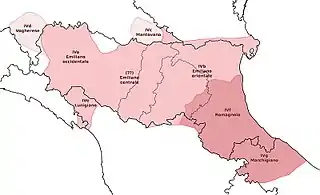Emilian-Romagnol linguistic group
Emilian-Romagnol (Italian: emiliano-romagnolo) is a linguistic continuum that is part of the Gallo-Romance languages spoken in the northern Italian region of Emilia-Romagna.[3] It is divided into two main varieties: Emilian and Romagnol.
| Emilian–Romagnol | |
|---|---|
| Native to | Italy, San Marino |
| Region | Primarily Emilia-Romagna, Marche, San Marino |
Native speakers | Unknown (4.4 million population): |
| Dialects | |
| Language codes | |
| ISO 639-3 | (code eml deprecated in 2009)[2] Individual codes: egl – Emilianrgn – Romagnol |
| Glottolog | emil1243 Emiliano-Romagnolo |
| Linguasphere | 51-AAA-ok |
 | |
Description
As part of the Gallo-Italic languages, Emilian-Romagnol is most closely related to the Lombard, Piedmontese and Ligurian languages, all of which are spoken in neighboring regions.
Among other Gallo-Italic languages, Emilian-Romagnol is characterized by systematic raising and diphthongization of Latin stressed vowels in open syllables, as well as widespread syncope of unstressed vowels other than /a/ and use of vowel gradation in the formation of plurals and certain verb tenses.[3]
Classification
While first registered under a single code in ISO standard 639-3, in 2009 this was retired in favour of two distinct codes for the two varieties, due to the cultural and literary split between the two parts of the region, making Emilian and Romagnol distinct ethnolinguistic entities.[4] Since 2015, Emilian and Romagnol are considered, with separated entries, definitely endangered languages according to the UNESCO Atlas of the World's Languages in Danger.[5][6]

- Emilian
- Carrarese dialect
- Lunigianese dialect
- Tortonese dialect
- Pavese-Vogherese dialect, Oltrepò dialect
- Placentine dialect, Bobbiese dialect
- Modenese dialect, Carpesan dialect, Mirandolese dialect, Frignanese dialect
- Reggio dialect, Guastallese dialect
- Parmesan dialect
- Casalmaggiore-Viadana dialect
- Mantuan dialect
- Lower Mantuan dialect
- Bolognese dialect
- Bologna city dialect
- Mid-mountains dialects
- Upper mountains dialects
- Northern plains dialects
- Eastern plains dialects
- Western plains dialects
- Ferrara dialect
- Comacchio dialect
- Romagnol
- Ravenna dialect
- Forlì dialect
- Cesena dialect
- Rimini dialect
- Sammarinese dialect
- north-eastern (Serravallian)
- south-western
- south-eastern
- Gallo-Picene: classification is disputed. While generally considered close to Romagnol, being part of the Gallo-Italic group, some have suggested a third component of Emilian-Romagnol continuum
- Urbinate dialect
- Montefeltrin dialect
- Pesarese dialect
- Fanese dialect
- Senigallia dialect
- Conero Gallo-Italic dialects
- Upper Tiber transitional dialects
Controversy
Native speakers reject the suggestion to consider Emilian-Romagnol as one language, which is perceived as an artifice imposed top-down by academics, and much rather prefer identify as speakers of distinct Emilian or Romagnol languages (especially in Romagna), or directly of the local variants of the two.
References
- "La lingua italiana, i dialetti e le lingue straniere Anno 2006" (PDF). istat.it. Retrieved 21 February 2018.
- "639 Identifier Documentation: eml". SIL International.
- Loporcaro, Michele (2009). Profilo linguistico dei dialetti italiani. Bari: Laterza. pp. 104–108. ISBN 978-88-420-8920-9. OCLC 318631969.
- "eml | ISO 639-3". iso639-3.sil.org. Retrieved 2021-08-21.
- "UNESCO Atlas of the World's Languages in danger". www.unesco.org. Retrieved 2021-08-21.
- "UNESCO Atlas of the World's Languages in danger". www.unesco.org. Retrieved 2021-08-21.